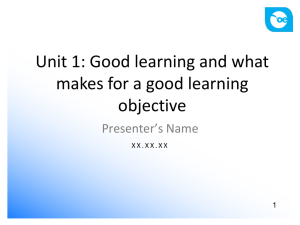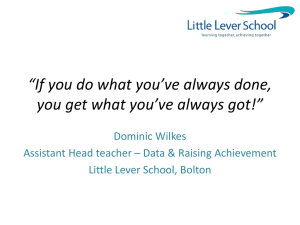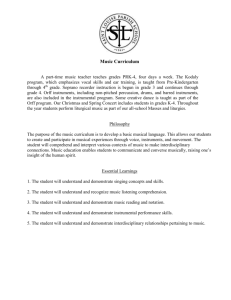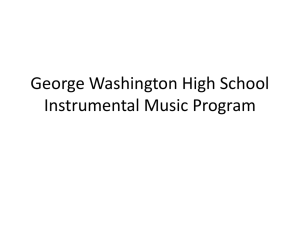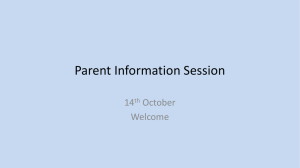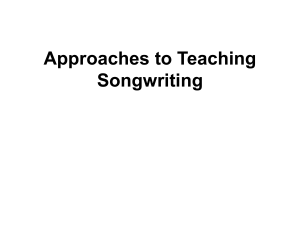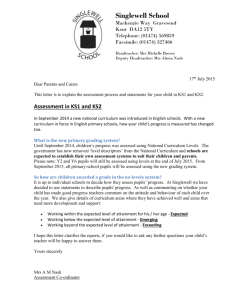LPS-Subject-Leaders-Report-12-13-Music-FINAL
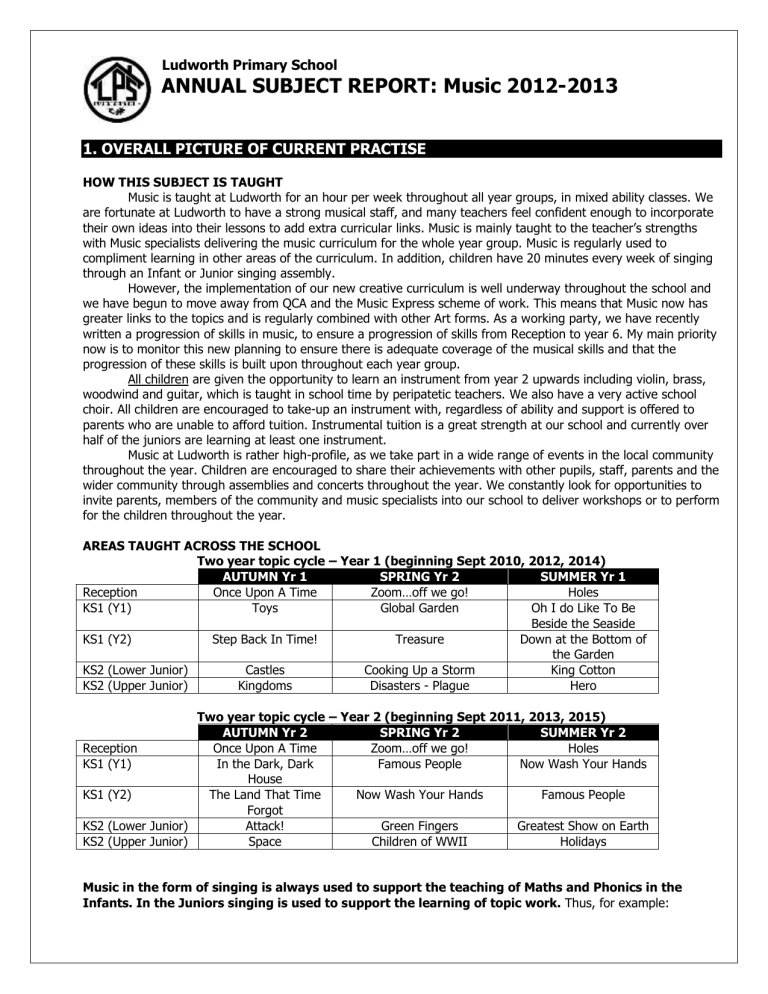
Ludworth Primary School
ANNUAL SUBJECT REPORT: Music 2012-2013
1. OVERALL PICTURE OF CURRENT PRACTISE
HOW THIS SUBJECT IS TAUGHT
Music is taught at Ludworth for an hour per week throughout all year groups, in mixed ability classes. We are fortunate at Ludworth to have a strong musical staff, and many teachers feel confident enough to incorporate their own ideas into their lessons to add extra curricular links. Music is mainly taught to the teacher’s strengths with Music specialists delivering the music curriculum for the whole year group. Music is regularly used to compliment learning in other areas of the curriculum. In addition, children have 20 minutes every week of singing through an Infant or Junior singing assembly.
However, the implementation of our new creative curriculum is well underway throughout the school and we have begun to move away from QCA and the Music Express scheme of work. This means that Music now has greater links to the topics and is regularly combined with other Art forms. As a working party, we have recently written a progression of skills in music, to ensure a progression of skills from Reception to year 6. My main priority now is to monitor this new planning to ensure there is adequate coverage of the musical skills and that the progression of these skills is built upon throughout each year group.
All children are given the opportunity to learn an instrument from year 2 upwards including violin, brass, woodwind and guitar, which is taught in school time by peripatetic teachers. We also have a very active school choir. All children are encouraged to take-up an instrument with, regardless of ability and support is offered to parents who are unable to afford tuition. Instrumental tuition is a great strength at our school and currently over half of the juniors are learning at least one instrument.
Music at Ludworth is rather high-profile, as we take part in a wide range of events in the local community throughout the year. Children are encouraged to share their achievements with other pupils, staff, parents and the wider community through assemblies and concerts throughout the year. We constantly look for opportunities to invite parents, members of the community and music specialists into our school to deliver workshops or to perform for the children throughout the year.
AREAS TAUGHT ACROSS THE SCHOOL
Two year topic cycle – Year 1 (beginning Sept 2010, 2012, 2014)
Reception
KS1 (Y1)
KS1 (Y2)
KS2 (Lower Junior)
KS2 (Upper Junior)
AUTUMN Yr 1
Once Upon A Time
Toys
Step Back In Time!
Castles
Kingdoms
SPRING Yr 2
Zoom…off we go!
Global Garden
Treasure
Cooking Up a Storm
Disasters - Plague
SUMMER Yr 1
Holes
Oh I do Like To Be
Beside the Seaside
Down at the Bottom of the Garden
King Cotton
Hero
Reception
KS1 (Y1)
KS1 (Y2)
Two year topic cycle – Year 2 (beginning Sept 2011, 2013, 2015)
AUTUMN Yr 2
Once Upon A Time
SPRING Yr 2
Zoom…off we go!
SUMMER Yr 2
Holes
Famous People Now Wash Your Hands In the Dark, Dark
House
The Land That Time
Forgot
Now Wash Your Hands Famous People
KS2 (Lower Junior)
KS2 (Upper Junior)
Attack!
Space
Green Fingers
Children of WWII
Greatest Show on Earth
Holidays
Music in the form of singing is always used to support the teaching of Maths and Phonics in the
Infants. In the Juniors singing is used to support the learning of topic work. Thus, for example:
Reception- When focusing on their topic ‘Zoom’ they experiment with body percussion and instruments to make crash/ bang/ zoom words. They use instruments to make short compositions of space and rockets.
Year 1- When learning about ‘Our Global Garden’ pupils make instruments using junk and recycled materials.
When studying ‘Famous People’ they composed and performed their own composition for the Queen’s Jubilee party.
Year 2- When studying ‘Pirates’ they listen to a wide range of music with a theme of water and compose their very own ‘water music’ which is recorded on a pictorial score. When learning the topic ‘Step back in Time’ they learn and perform a wide range of songs from the past.
Year 3/ 4 – Whilst focusing on the topic ‘Attack’ the children compose their own ostinatos and perform these on instruments to create rowing/ war music. During our topic ‘Greensleeves’ the children learn simple musical notation when playing the recorder.
Year 5/ 6 – When studying ‘Disasters’, children create sound effects to accompany film clips of disasters. They then work towards creating a composition for a Volcanic erruption/ flood etc.
HOW THE SUBJECT IS ASSESSED
In class, the teachers themselves monitor the progress of individual children and differentiate lessons to suit the needs of different abilities. Lessons are observed in each key stage and planning monitored on an annual basis, which feeds into this report. Children who are particularly talented in Music have the opportunity to join our school choir, wind band and are also entered for examinations with the ABRSM.
KEEPING INFORMED
I have kept myself informed by reading recent national subject reports by Ofsted, which assist me to see where best practise is occurring. I use this to consider how we as a school can further improve. The latest subject report can be seen at ..\Ofsted Guidance and Support\Ofsted - Music.pdf
and ..\Ofsted Guidance and Support\Music in schools wider still_ and wider.doc
RECENT DEVELOPMENTS
I have also made myself aware of the criteria for judging subject leadership, made by Ofsted. This is available and has been noted, at ..\Ofsted Guidance and Support\Ofsted Subject Inspections - Guidance for Inspectors
2012\Ofsted Survey Visits Guidance - Music.doc
2. MONITORING, EVALUATION AND REVIEW
LESSON OBSERVATION
I am timetabled opportunities in the Spring Term to observe music lessons throughout the school. I have, however observed music lessons and numerous performances given by children learning an instrument. All children are achieving and making very good progress with a significant number being entered for ABRSM exams each year.
PLANNING
An examination of teachers’ planning has revealed that teachers make strong and creative links to their topic and look for any opportunities to incorporate music into their topic lessons. Planning shows clear learning objectives and outcomes with good use of a range of resources. Planning shows a good range of activities, use of vocabulary and resources to develop children’s learning.
Differentiation is mainly by outcome or by organising children into mixed ability-pairs. However, now that we have written a skills bank, planning must ensure reference to the skills bank. This will mean that there is a clear progression of musical skills that the children adopt whilst moving through each year group.
WHAT TEACHERS SAY ABOUT TEACHING THIS SUBJECT
I have discussed teaching this subject with a range of teachers across the school. Teachers are confident when linking music to their topics. They feel that they are confident about delivering music lessons and are very knowledgeable about the musical skills they are delivering. This is because we are incredibly lucky to have 3 music specialists as teachers who are responsible for teaching their year group for music. These teachers ensure that all children are given the opportunity to participate whatever their ability. Differentiation is organised by outcome and numerous opportunities are given to gifted and talented children by asking them to lead or demonstrate to the class. Teachers regularly use success criteria to ensure that children produce quality pieces of work when composing. Where they feel less confident, staff will either ask for ideas from colleagues or approach myself for support.
WHAT PUPILS SAY THEIR SUBJECT IS TYPICALLY LIKE
A recent discussion between myself and with pupils has shown that Music is an enjoyable subject in school where children are able to achieve well and be proud of what they have done. Children said:
“There’s always lots of music going on in school”.
“I got to go on stage at the X-factor and sing in front of everyone”.
“I really enjoy choir because we got to go busking and to Winter wonderland”.
“Music is always enthusiastic”.
“We sing really good songs in assembly”.
“We learnt about Egyptian instruments and some of them we have today, like the flute!”
“We talked about what inspired composers to make up their music like love, relaxing……”
“I really like using all the instruments, we do that a lot!”
Pupils commented that they would like to do more composing and learn how to make up their own music using instruments.
RESOURCES
We have a very good stock of un-tuned percussion instruments and music books through money raised from busking at Christmas time. These instruments are regularly used throughout the whole-school in class music lessons and by Language group.
We have recently purchased a brand-new stock of music stands for Wind Band and instrumental lessons.
Using the money raised at this year’s busking events, we are planning to replace the school head microphones for performances.
3. CONCLUSION
CURRENT STANDARDS AND PROGRESS
As subject leader, I have observed music teaching from peripatetic teachers, looked at teacher’s planning and had discussions with both the staff and pupils. From the evidence I collected, I find the teaching of Music and the standard of children’s learning to be above National standards. During their time here, I believe pupils generally exceed standards compared to that which would normally be expected in other schools and have a plethora of opportunities when taking part in musical events.
During a discussion with a group of children from Reception to Year 6, all pupils showed great enthusiasm for
Music. They all agreed that there were plenty of opportunities to participate in Musical activities and to play instruments. They were particularly positive about the visits and concerts throughout the year, especially the Yr 6 production, music evening, X Factor and busking. All children felt that the level of work during class lessons was just about right and thought the work was interesting and fun. However, further up the school the pupils said that they would like to have more opportunities to use the instruments and to compose. They would also like to have more opportunities in lessons and during visit/workshops to play more modern music such as rock/pop.
PRIORITIES FOR FUTURE DEVELOPMENT
1. To continue to raise the profile of singing throughout school, using ‘sing-up’ in assemblies and during class lessons to support learning.
2.
3.
To observe teaching of music in classes throughout the school in the Spring term.
To ensure that the Music skills bank is referenced to in weekly planning to ensure progression of skills is maintained throughout the year groups.
GOVERNOR MONITORING
The governor responsible for monitoring this subject is Reverend Graham Hawley.
He has visited the school this year and observed choir and brass lessons. He is planning to visit next year to observe class music lessons. I have discussed with him the areas on this subject report to ensure he is well informed on an on-going basis. His report will go to the Headteacher and to myself so we can all be informed as to the outcomes and the next steps can be planned.
Rachel Tindale – Subject Leader, Music
